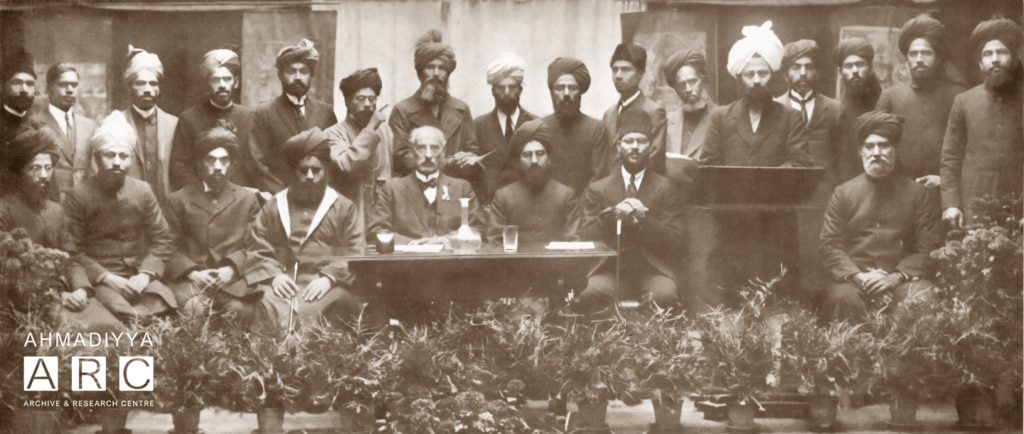Hazrat Maulvi Abdur Rahim Nayyarra (1883-1948)

Maulvi Abdul Rahim Dard[ra] MA and Maulvi Ghulam Farid[ra] MA are diligently engaged in conveying the message of truth [i.e., Islam Ahmadiyyat] in England. The journey of Hazrat Khalifatul Masih II[ra] to London, along with a delegation, on the occasion of the Conference of Religions, his laying of the foundation stone of the first House of God in the capital of the British Empire – an event indicative of the good fortune of the Western world – his leading of congregational prayers as the first imam in the mosque constructed in the capital of the French Empire and his dignified arrival in Rome, the epicenter of Christianity, as the representative of the Promised Messiahas, are all events of great significance. On the one hand, these occurrences offer an opportunity for reflection and contemplation to those awaiting the second advent of the Messiah, particularly those who, in 1924, wished to witness the descent of their lord in his glory. On the other hand, these developments are a source of reassurance for the community of believers, as they have established the honour of Islam in the eyes of the scholarly circles. Many among the intellectuals of Europe, including Sir E Denison Ross, President of the Conference of Religions, have remarked:
“Ahmadiyyat is the only hope for Islam.”
There is also a considerable number of individuals who are drawn to the simple and appealing principles of Islam, yet feel disillusioned by the practical conditions of Muslim countries and the conduct of those who are so-called Muslims, as well as by the corrupt doctrines espoused by their clerics.
The voice of this discerning class was heard during the Ahmadiyya session of the Conference of Religions, articulated through Sir Theodore Morison, former Principal of Aligarh. Upon listening to the teachings of Islam as presented by the Promised Messiahas, he remarked:
“I consider myself fortunate to have lived to see the emergence of this new [revival] movement among Muslims.”
In short, the tour of the Imam of the Ahmadiyya Community to the West has generated a movement that our missionaries are actively utilising and sustaining through The Review of Religions. There is scarcely a person of religious or literary interest in England who has not come across our magazine. Moreover, the magazine is being widely circulated not only in England but also in various other countries around the world.
Our missionaries have also begun delivering outdoor lectures and based on my personal experience, these speeches have proven to be effective and beneficial.
Condemnation of the persecution of Ahmadis in Afghanistan
Our friends are already familiar with the resolution published in Al Fazl […], which has reached every corner of the globe through world-renowned British authors and eminent intellectuals. Our objective in disseminating this resolution is to safeguard the faith of Prophet Muhammadsa of Arabia from the misguided actions of those who claim to be his followers and to make it known to the world that those who recite the creed (kalimah) in the house of the Arabian Prophetsa are the crowned [protectors of Islam]. And the crownless are the enemies of Islam who, at a time when powerful external forces are aligned against the Holy Prophetsa, are attacking from within, targeting his sacred legacy.
The act of stoning – or supporting such actions – is not an outcome of Islamic teaching, but rather a manifestation of ignorance and savagery that has overtaken this defaming faction as a consequence of their estrangement from the light of Islam. It is for this very reason that the Holy Prophetsa has called such individuals as akin to the Jews.
In short, the protection of Islam compels us to keep alive the memory of the martyrs’ sacrifices and to cleanse the noble face of Islam from this unsightly stain. This objective is being pursued through the adoption of resolutions by various European societies. Among the many communications received by our London Mission, the following statement is particularly noteworthy:
“The days of the ‘Inquisition’ seem very far from us now and it is almost unbelievable that in any country such a state of things should exist at the present time, but the report of the stoning to death of two more devotees of the Ahmadiyya movement in Islam makes us realise how slow civilisation seems to be in spreading over the world.”
A continuous stream of letters has been arriving from individuals across all European countries. Among them is a letter from a prominent individual of Indian origin, from which the following excerpt is presented:
“Afghanistan is, in truth, the most barbaric country and the most backwards in terms of civilisation. Based on reports in the press, it appears that the Afghan government itself is beginning to feel ashamed of its disgraceful actions. Like others in this nation, I, too, was deeply grieved upon reading of the atrocities committed in Kabul. You may rest assured of my full sympathy in every possible way.”
(Translated by Al Hakam from the original Urdu, published in the 23 April 1925 issue of Al Fazl)

